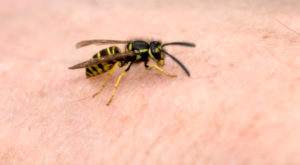Insect Sting Allergies
Insect Sting Allergies
The most common symptoms experienced by most people after an insect sting are swelling, redness, and pain at the site of the sting. These symptoms usually resolve within a few days. However, some of us are “allergic” to the insect venoms and the stings can lead to severe life-threatening reactions. In fact, about half a million people seek emergency room care every year in the U.S. for insect sting reactions and about 50 deaths are reported each year from these reactions. Though they can occur at any time of the year, they are most common in the summer months in our greater Washington DC metropolitan area.
If we are predisposed to develop allergic reactions to insect stings, our immune systems make IgE antibodies to the venom after an initial sting. If we are stung by the same insect again, the antibodies interact with the venom and cause the release of certain chemicals into the bloodstream which causes these serious reactions to occur. The manifestations of these systemic reactions can range from a few itchy hives (away from the site of the sting) to throat swelling, difficulty in breathing, and/or a drop in blood pressure. These symptoms make up what is referred to as anaphylaxis, which can be fatal if not treated rapidly.
Though many insects cause local reactions, almost all the severe generalized reactions are caused only by four types of insects commonly found in northern Virginia, Washington DC and the surrounding areas. These stinging insects include: Honey bees (live in colonies or “honeycombs” in hollow trees or cavities of buildings), Yellow Jackets (usually nest underground and rarely in woodpiles or cracks in masonry), Hornets (grey or brown football shaped nests above the ground in branches of trees or in shrubbery), and Wasps (nests made up of a paper-like material under eaves, behind shutters, or in shrubs). Note that in the southern parts of the U.S. where the climate is warmer, the fire ant is commonplace. Fire ants will bite its victim causing small painful pustules on the skin, and in addition, they can cause systemic anaphylactic reactions in sensitive individuals.
A few precautions like avoiding walking outdoors with exposed skin, avoiding wearing dark colored clothing, and avoiding the use of strong perfumes and/or deodorants can reduce the chances of insect stings. If one has a systemic reaction following an insect sting, he or she has about a 60% chance of a similar or more severe reaction in case of a subsequent sting by the same insect. If one is stung by a bee, the stinger of the bee is usually left in the person’s skin, unlike the other insects mentioned above. One should never pull out the stinger as this can cause the venom sac below the skin to secrete more venom into the bloodstream making the sting even more dangerous. Instead, one should scrape off the stinger with a fingernail, credit card, or other flat-edged object.
The diagnosis of venom hypersensitivity (allergy to insect stings) is fairly easy to do, but should be done by a qualified allergist. The diagnosis is established after a thorough history is taken together with a physical examination and skin testing and/or blood testing to the various species of insect venoms. If it is established that an individual is “allergic” to one or more stinging insects, it is extremely important that the individual be treated.
Luckily there is a highly efficacious treatment option called Venom Immunotherapy (venom shots), which has proved to be 97% effective in preventing life-threatening reactions in people who are sensitized to the insect venoms. All patients should be prescribed a self-injectable form of Epinephrine (Adrenaline). Some common brands include an EpiPen, Auvi-Q or Adrenaclick. In addition, all patients should be taught when and how to use these devices as well as what to do after using them.
The board certified allergists at Black and Kletz Allergy have helped hundreds of patients sensitized to insect venoms in the Virginia, DC, and Maryland metropolitan area to lead a near normal life without the fear of a serious reaction from insect stings. We have been able to do this through patient education, training in self-injectable Epinephrine, and most effectively by venom desensitization.













